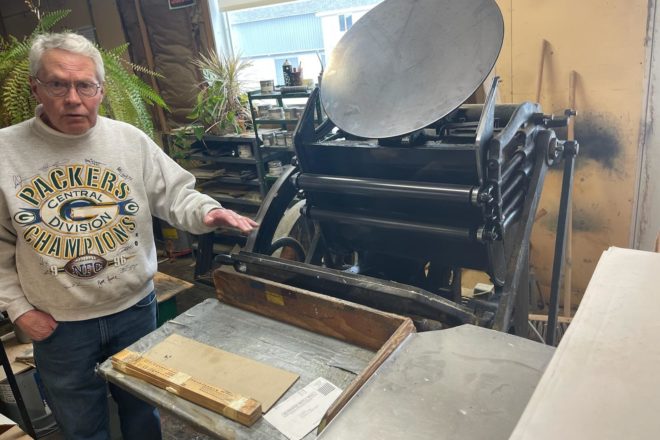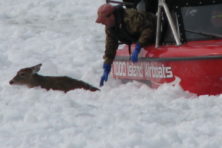Ellison Bay Manufacturer Closing Up Shop
- Share
- Tweet
- Pin
- Share

Woodrow Engineering has operated south of Ellison Bay since 1971
Mike Ball said his dad didn’t love the name ‘Woodrow Engineering,’ because it didn’t precisely describe what the business did.
Through the years, Ball grew to love the label for the business in a 16,000-square-foot former cherry-processing plant south of Ellison Bay that has housed his light manufacturing plant since 1971.
This year, he’s selling off his inventories, tools and equipment to eventually sell the building.
“People have been driving by for 40 years and they have absolutely no idea what we do,” Ball said.
He said he’s “not an ego guy,” so he didn’t need his name on the sign outside. He also loved the mysteriousness of “Engineering” on the sign. People left him alone while he built the business into the nation’s largest producer of professional-scale rulers for the construction industry, and the largest manufacturer of foot measures.
With as many as seven full-time employees and a few part-timers, Woodrow Engineering created custom-imprinted rulers that construction company operators, architects and engineers bought in bulk and handed out as a useful tool, and as advertising.
Woodrow employees precisely cut wood strips for 6-inch, 12-inch and 18-inch rules. They used various shaper saws with custom-fit heads to create grooves to precisely accommodate vinyl scales at the edge of the ruler. On the back, they printed metric conversion tables or scales as fine as inches in 30ths and inches in 60ths for blueprint-reading.

Mike Ball’s father, Charles, acquired the rights to manufacture the RITZ Stick, America’s first standardized foot-measure device that was developed before World War I. Photo by Craig Sterrett. 
Woodrow Engineering has been a major producer of civil-engineering rulers and custom-imprinted rulers that doubled as construction industry advertising swag. Photo by Craig Sterrett. 
Mike Ball holds the foldable, take-home foot-measure device he invented and patented. Photo by Craig Sterrett.
Ball modified vintage Golding letterpress machines so the two hand-operated machines would gently print scales on 3/16th- to 3/8-inch-thick wood instead of paper.
“It used to be that nobody could print on wood like we do, with this detail,” Ball said.
Two entrepreneurs started the business in 1946 in Chicago. The two routinely named businesses after presidents, and named this one for Woodrow Wilson. When Mike’s dad, Charles Ball, bought the business, the bulk of orders came from publishers who needed scales in picas and points for measuring letter sizes and spacing. Charles took the business in additional directions, moving it from Clark Street in Chicago to a larger plant in Northbrook, Illinois. Charles moved operations to the building near Ellison Bay in 1971. Mike joined the business in 1972, helped to expand it, and bought it in 1986.
For years, the business printed scales in Chicago for the manufacturer of the RITZ Stick – the nation’s first standard foot-measure tool.
In 1913, inventor Oliver Cornelius Ritz-Waller, frustrated by inconsistent shoe and foot sizing, developed the measure and patented it in 1916. Mike said one of Ritz-Waller’s biggest orders came from the U.S. military, which needed to fit soldiers for boots before World War I. In the early 1960s, Ritz-Waller’s widow asked Charles Ball to buy the Ritz Stick business, one of many items Ritz-Waller invented and manufactured at the American Automatic Devices Co., Mike noted.
Mike later became an inventor, too.
Mike patented a plastic, fold-up, home-use version of the foot-measure – The Footer Family Foot Measure – thinking of parents whose childrens’ feet were growing rapidly.
Mike’s son also was a creator. Michael Jr. had the idea about 10 years ago to package the “Footer” with a tailor’s tape, growth chart and activity book that families could use to record heights, weights, friends’ names, favorite foods’ and more as they grew up.
In 2015, that Watch Me Grow package won a bronze medal in the national Moonbeam Children’s Book Awards.
Ball has a few hundred RITZ Sticks left. Until the proliferation of big box stores in the 1980s, sales came easily to wholesalers who provided for mom-and-pop shoe stores, he said. One customer, Academy Sports, a sporting goods chain similar to Dick’s, orders a lot of those now.
Ball said he could probably stay in business five more years, filling various orders for customers such as 4imprint.com.
“There’s nothing wrong with the product and there’s still demand,” he said – although he said he doesn’t know how many people will use rulers 10 years from now.
Difficulties during the COVID-19 pandemic, supply-chain issues and the difficulty of finding employees who can afford to live in northern Door County curbed his enthusiasm. The unexpected death of his son, Michael, two years ago from cardiac arrest also took a toll.
“The challenges that used to be fun and exciting to the young man, the go-getter, just weren’t so much fun anymore,” he said.
The business did well enough in its good years – cranking out hundreds of thousands of rulers per year between 2000 and 2008 – that he didn’t need to sell the business to gain value to retire. He’ll just sell the building after he empties it – and looks forward to enjoying retirement with his wife on their property near Gills Rock.


